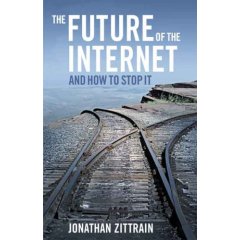
Just spotted that my review of Jonathan Zittrain’s book is out. Find it in Management Today.


Just spotted that my review of Jonathan Zittrain’s book is out. Find it in Management Today.
The Naughton household is deep into a discussion about the positive side of certain words. For example, one often comes across the word ‘disgruntled’; but where — outside of PG Wodehouse — will you find ‘gruntled’? (It’s the kind of thing Bertie Wooster might say, I suppose.) And what about ‘consolate’? And when was the last time you saw anyone nicely ‘shevelled’? Eh?
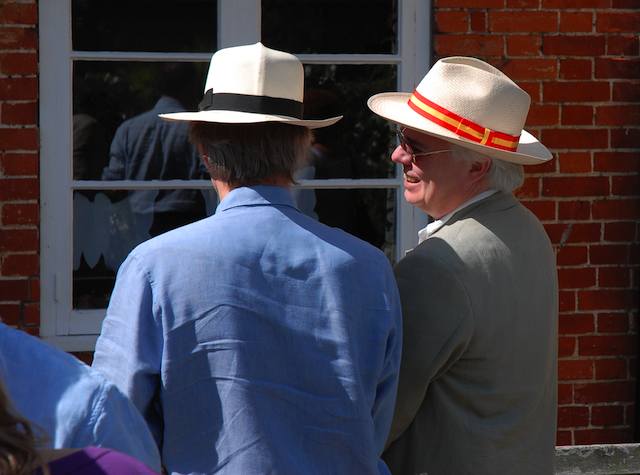
Spotted at Nicci’s birthday party — Julian Barnes on the left, deep in conversation with Francis Wheen (who is wearing his MCC hat). I’d forgotten to bring headgear (bad news for a guy who’s lost most of his hair) and so was reduced to wearing one of Sean’s gardening hats, which made me indistinguishable from a tramp. Sigh.
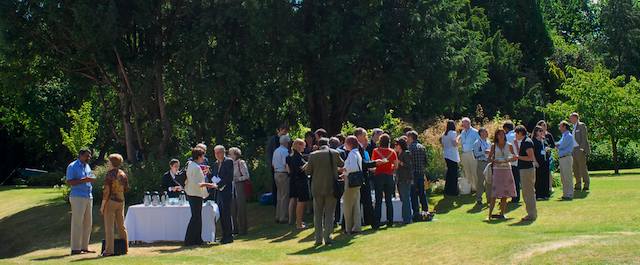
If you’d dropped a bomb on the Cavonius Centre at Gonville & Caius College in Cambridge any time in the last two days then you’d have wiped out most of the senior creative people in the BBC (plus a few academics). They were gathered for the annual media seminar organised by my colleague Joe Smith in collaboration with Roger Harrabin and others from the BBC and IBT, who now has the grand title of BBC Environmental Analyst. The purpose of the event is to get the BBC folks away from their highly-pressured environment and expose them to a spectrum of thinkers from academia and the arts world. I chaired one of the ongoing panels (with the magnificently opaque theme of ‘Things’). My fellow-panellists were a fascinating mix: Edmund de Waal, who is a distinguished potter and Professor of Ceramics at Westminster University; Dilys Williams, the Director of the Centre for Sustainable Fashion, at the London College of Fashion (both shown below); Heather Ackroyd, an amazingly inventive artist; and Tony Lake, who until a few weeks ago was Chief Constable of Lincolnshire.
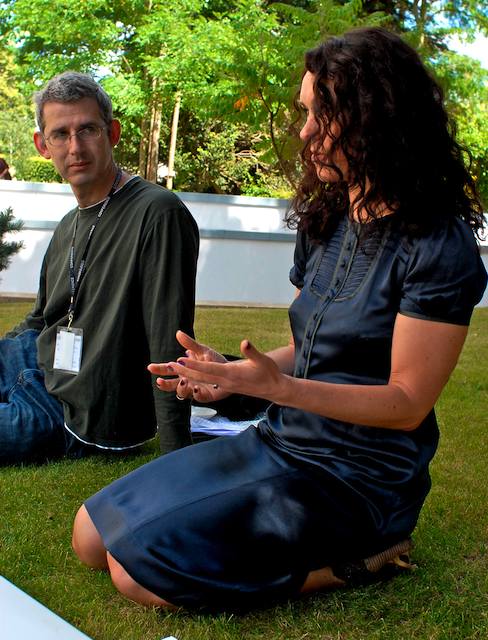
The overall idea of these gatherings is to reflect on interdependence. The theme this year was “Real World: storytelling in an interconnected world”. Not surprisingly, there was a lot of collective agonising about the state of the public debate about subjects like climate change and DNA testing — and on the role of the mainstream media in fostering (or hampering) those debates. The openness and vigour of the debate between the editors and programme-makers and their bosses was impressive. The BBC continues to employ a lot of intelligent and perceptive people.
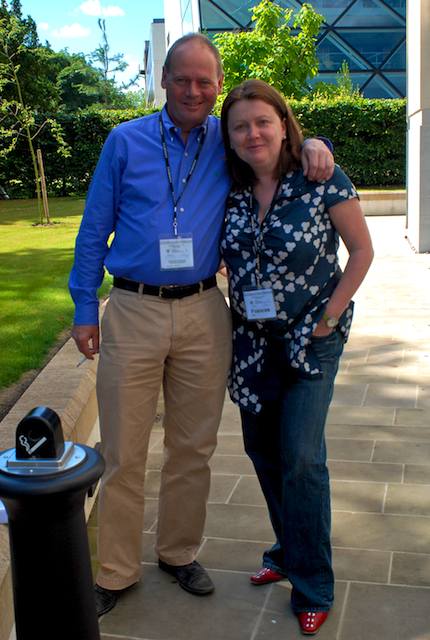
For me, one of the high points of the seminar was meeting John Lloyd, the producer/writer behind a staggering list of comedy shows. (The photograph shows him with Frances Weil of BBC Vision, one of the organising team.) He was co-chair of the event, and did it with grace, perceptiveness and wit. It’s not often that someone whom one knows only by reputation comes up to scratch. And wonderful when they surpass one’s wildest expectations.

Seen in a lift in Cambridge. I know it’s a corny headline, but I couldn’t resist it.
This is truly — as Marc Rotenberg, executive director of the Electronic Privacy Information Center put it — one of those “I told you so” moments.
For every video on YouTube, the judge required Google to turn over to Viacom the login name of every user who had watched it, and the address of their computer, known as an I.P. or Internet protocol address.
Both companies have argued that I.P. addresses alone cannot be used to unmask the identities of individuals with certainty. But in many cases, technology experts and others have been able to link I.P. addresses to individuals using other records of their online activities.
The amount of data covered by the order is staggering, as it includes every video watched on YouTube since its founding in 2005. In April alone, 82 million people in the United States watched 4.1 billion clips there, according to comScore. Some experts say virtually every Internet user has visited YouTube.
Of course Viacom swears blind that the only people who will have access to this information are its lawyers (who are working on its $1 billion copyright infringement suit against Google). But it brings one up sharply against the implications of cloud computing.
Hmmm… This is beginning to turn into a meme.
That’s one of the topics Walter Mossberg gestured at this afternoon in a talk on “the Future of the Internet and Rise of the Cell Phone,” in which he declared that the PC has peaked, and that the future of the internet belongs to pocket computers like the iPhone. The future of the internet, and the future of us: “The internet is a grid,” he remarked, “and we’re all going to be living on it, and carrying it in our pocket all day long.” Mossberg delivered this assessment with a strong note of techno-pessimism woven in: A lot of his talk had to do with the issues constant connectivity raises for deep knowledge (“people hate iPhone users,” he remarked, “because you can never have an argument about facts without them whipping out the phone and looking up the answer” – a description that I’m afraid I resemble, even though I have a Blackberry and not an iPhone) and deep reflection (in the future, Mossberg noted, we may never be free of “that subtle feeling that maybe you need to check Slate, or Facebook”)…
From Good Morning Silicon Valley.
For people who are too wary of commitment to shell out upwards of $375 for Microsoft Office Professional or $100 or more on the Home and Student edition, Microsoft is introducing a subscription version. For $70 a year, you’ll be able to rent Microsoft Equipt, a package that combines Office with Microsoft’s Live OneCare security package, with free upgrades when new versions arrive and access to the already free Live Workspace and other online products. The Equipt package can be installed on up to three PCs at a time. Whether this represents a good deal depends on the nature of your needs for Office and the worth to you of OneCare, but it does lower the entry barrier for holdouts.
The curious part of the move is Microsoft’s choice of a retail channel — initially, at least, Equipt will be available only through the nearly 700 Circuit City stores. Microsoft believes that the concept of Equipt represents a “complicated value proposition,” and that the staff of Circuit City has the ability, according to Office group product manager Bryson Gordon, to engage customers in a “kind of a high-touch scenario. Equipt is better sold than bought.” Circuit City undoubtedly appreciated the kind words, especially as its stock dropped to a 17-year low after Blockbuster came to its senses and dropped its $1.35 billion takeover offer.
From Technology Review…
The Web would be useless without search engines. But as good as Google and Yahoo are at finding online information, much on it remains hidden, or difficult to rank in search results. On Tuesday, however, Adobe took a major step toward opening up tens of millions of pages to Google and Yahoo. The company has provided the search engines with a specialized version of its Flash animation player that reveals information about text and links in Flash files. It’s a move that could be a boon to advertisers, in particular, who have traditionally had to choose between building a site that’s aesthetically pleasing and one that can be ranked in a Web search.
The new software is required only to index Flash files, not to play them, says Justin Everett-Church, senior product manager for Adobe Flash Player. Web surfers don’t need to download a new Flash player, and content providers don’t have to change the way they write applications. “For end users, they’re going to see a lot more results and a lot better results,” says Everett-Church. “The perfect result may have been out there but trapped in a SWF [Shockwave Flash file]. But now they can find it.”
Interesting NYT column by David Brooks.
When he is swept up in rhetorical fervor, Obama occasionally says that his campaign is 90 percent funded by small donors. He has indeed had great success with small donors, but only about 45 percent of his money comes from donations of $200 or less.
The real core of his financial support is something else, the rising class of information age analysts. Once, the wealthy were solidly Republican. But the information age rewards education with money. There are many smart high achievers who grew up in liberal suburbs around San Francisco, L.A. and New York, went to left-leaning universities like Harvard and Berkeley and took their values with them when they became investment bankers, doctors and litigators.
Political analysts now notice a gap between professionals and managers. Professionals, like lawyers and media types, tend to vote and give Democratic. Corporate managers tend to vote and give Republican. The former get their values from competitive universities and the media world; the latter get theirs from churches, management seminars and the country club.
The trends are pretty clear: rising economic sectors tend to favor Democrats while declining economic sectors are more likely to favor Republicans. The Democratic Party (not just Obama) has huge fund-raising advantages among people who work in electronics, communications, law and the catchall category of finance, insurance and real estate. Republicans have the advantage in agribusiness, oil and gas and transportation. Which set of sectors do you think are going to grow most quickly in this century’s service economy?